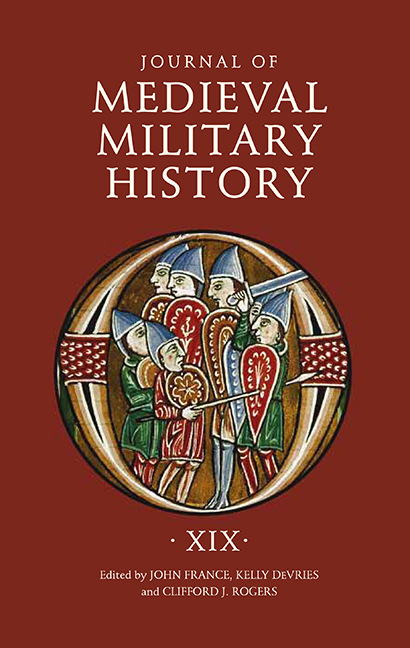Book contents
- Frontmatter
- Contents
- List of Illustrations
- 1 The Battle of Firāḍ: The Day on Which Khālid b. al-Walīd Did [Not] Defeat Both Byzantines and Persians
- 2 A Mislocated Battlefield? Battle Flats: The Battle of Stamford Bridge, 1066
- 3 The Frankish Campaign of 1133–1134 in Northern Syria and the Battle of Qinnasrīn
- 4 Bella Plus Quam Civilia? The Place of Battle in the Context of Civil War under the Anglo-Norman and Angevin Kings, c. 1100–c. 1217
- 5 Edward I’s War on the Continent, 1297–1298: A New Appraisal
- 6 The Earliest European Recipes for “Powder for Guns” (1336 and 1338–c. 1350)
- 7 Bellicose Rhetoric: The Memorable War Speeches of One Aragonese Royal Couple
- 8 Coureurs and Their Role in Late Medieval Warfare
- List of Contributors
- Journal of Medieval Military History 1477–545X
1 - The Battle of Firāḍ: The Day on Which Khālid b. al-Walīd Did [Not] Defeat Both Byzantines and Persians
Published online by Cambridge University Press: 02 June 2021
- Frontmatter
- Contents
- List of Illustrations
- 1 The Battle of Firāḍ: The Day on Which Khālid b. al-Walīd Did [Not] Defeat Both Byzantines and Persians
- 2 A Mislocated Battlefield? Battle Flats: The Battle of Stamford Bridge, 1066
- 3 The Frankish Campaign of 1133–1134 in Northern Syria and the Battle of Qinnasrīn
- 4 Bella Plus Quam Civilia? The Place of Battle in the Context of Civil War under the Anglo-Norman and Angevin Kings, c. 1100–c. 1217
- 5 Edward I’s War on the Continent, 1297–1298: A New Appraisal
- 6 The Earliest European Recipes for “Powder for Guns” (1336 and 1338–c. 1350)
- 7 Bellicose Rhetoric: The Memorable War Speeches of One Aragonese Royal Couple
- 8 Coureurs and Their Role in Late Medieval Warfare
- List of Contributors
- Journal of Medieval Military History 1477–545X
Summary
This article examines of the battle of Firāḍ, which took place in 634 between the Muslim Arabs and a Byzantine–Persian coalition. A critical analysis of the medieval Arabic sources reveals the following: a) the Byzantines were in command of the allied forces, b) the battle was caused by the fact that the Byzantine forces garrisoning the fortress were an obstacle in Khālid b. al-Walīd and his forces’ route from Iraq into Syria, and c) the Byzantines emerged victorious from the engagement, forcing the Arab general to undertake his famous desert march.
The battle of Firāḍ (also known as the battle of Firaz) is a well-known engagement among scholars of Arabic history, in the course of which, according to Arabic sources, the Arabs, under the leadership of that period's military savant Khālid b. al-Walīd, known as the Sword of Allah (Sayf Allāh) crushed a coalition of their enemies, consisting of Byzantines, Persians and Christian Arabs. However, scholarship on the battle raises a number of questions, to such an extent that even its historicity is debatable. The present article will attempt, after examining the references made in the sources, to offer a new interpretation, which we believe covers many of the extant historical gaps.
The battle was the final act in the early phase of Muslim expansion against the Sassanid Persian Empire, into Iraq in particular, which neighbored Arabia. This Arabian campaign began during the reign of Caliph Abū Bakr, who, as the first caliph, had succeeded in energetically putting down a string of revolts by Arab tribal leaders that had broken out after the death of the Prophet. These tribesmen had attempted to exploit the fact in order to break away from the dominion of Mecca (the Ridda Wars). Having achieved the political dominance of Ummah over the Arabian Peninsula after this success, he decided that the aggressiveness of his warriors would be best turned against the two neighboring empires, Byzantium and Persia. The timing of this decision was truly favorable, as the two great powers of that period had not yet managed to heal the wounds caused by the exhausting, drawn-out conflict between them, which had only ended a few years earlier.
- Type
- Chapter
- Information
- Journal of Medieval Military HistoryVolume XIX, pp. 1 - 20Publisher: Boydell & BrewerPrint publication year: 2021



